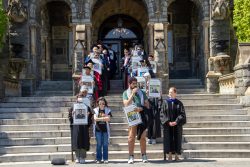On Tuesday, the Georgetown University Student Association approved a resolution responding to the conditions placed on the University’s 10-Year Plan outlined in the D.C. Board of Zoning and Adjustment’s recent proposal. Members of GUSA plan to work with Campaign Georgetown and an Advisory Neighborhood Council Commissioner this summer to further develop this response.
The GUSA proposal will be submitted to University administrators and may be presented before the BZA at its next hearing in June.
The proposal was written by GUSA President Ryan DuBose (CAS ‘02), Vice-President Brian Walsh (CAS ‘02) and Junior class representative Marty LaFalce (CAS ‘03).
The proposal points out that University students “must be granted full rights as citizens under the law.” LaFalce said that in the conditions set by the BZA, students were being discriminated against based on the fact that they were students. “Our biggest issue is that we’re not being treated as citizens,” he said. “The BZA violated our rights as students.”
One of the conditions set on the University’s 10-Year Plan was for the University to report all student violations to D.C. regulatory agencies, as well as reporting violations of the Student Code of Conduct to students’ parents.
In response to this condition, the GUSA proposal states that the University’s “primary function is that of an educational institution and not as a District of Columbia regulatory body.”
GUSA’s proposal also states the BZA did not acknowledge the ANC or the Office of Planning’s approval of the University’s most recent version of the 10-Year Plan.
“The problem with the order is that the BZA ignored the approval of the ANC,” said ANC Commissioner Justin Wagner (CAS ‘03). “The 10-Year Plan was passed through the ANC twice … We approved the enrollment increase, we were concerned with student conduct and the University has done a whole host of things to improve this,” Wagner said. “The BZA ignored the local community here.”
The GUSA proposal opposes several other conditions placed on the University, including the enrollment cap, the publication of complaints against student conduct and a mandatory public record of student license plate numbers.
“[These conditions] clearly involve student rights,” LaFalce said, adding that the condition placed on the enrollment increase is outside of the BZA’s jurisdiction.
“We don’t say we definitely want an enrollment increase or an enrollment cap,” La Falce said. “What we want is for the the University to tell us why they think the enrollment increase is necessary.”
LaFalce said GUSA’s first priority is to ensure students are protected. He said students’ interests may not necessarily reflect those of the administration. LaFalce said the administration is probably most concerned with the approval of the enrollment increase.
“The administration could easily comply with the BZA restrictions because they want to see the completion of the 10-Year Plan,” LaFalce said.
Senior representative Steve Glickman (CAS ‘02) said that he abstained from voting on the proposal because it “didn’t have enough teeth in it.” Glickman said the proposal took a position against the BZA order, but did not outline a plan of action.
Wagner said that the ANC is not yet involved in the process, but he is personally working with Campaign Georgetown and GUSA to develop a formal response.
“We trust the University to do what is best for us, but we need to be prepared to perhaps go ahead with legal action,” Wagner said. “We’re separated from the University because we have separate interests.”
LaFalce said that GUSA is currently seeking a pro-bono counsel.
“If we can’t get a counsel, we’ll use Campaign Georgetown and GUSA as a mouthpiece,” he said.
Wagner said that he plans to work with other universities in the area. “So many students live here, if we come together as a voting block, we can work to see that we’re recognized as citizens.”
LaFalce said that this summer he plans to coordinate GUSA’s efforts with students from George Washington University and other D.C. schools facing similar issues with the BZA.
“Many universities deal with the BZA on these types of issues. If we have a united front, we’ll have a greater opportunity to play a stronger role,” LaFalce said.
The University has not yet decided on its official response to the BZA order. “We’re asking multiple attorneys to present their analysis of our options,” Juan Gonzalez, Vice President of Student Affairs said.




